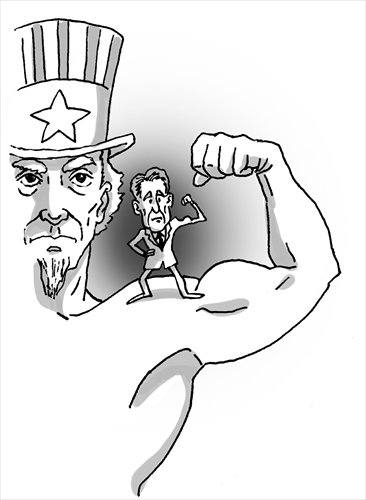


Illustration: Liu Rui/GT
Japanese Prime Minister Shinzo Abe will highlight his trip to the US in late April with a joint address to both houses of the US Congress and tout the solid Japan-US alliance despite Tokyo's strained ties with its neighbors. He carries a long list of missions to accomplish during the eight-day tour, which includes the Trans-Pacific Partnership (TPP), the military alliance, and climate change.
Revision of the Guidelines for US-Japan Defense Cooperation is an important part of bilateral cooperation and may make some progress during the trip after the two governments decided to postpone it in December. The updates to the guidelines will likely address Abe's attempts to ease the restrictions on exercising the right of collective self-defense and to enhance their security cooperation, which moderately raises Japan's position in the alliance.
The revision will also respond to some matters proposed in Japan's new national security framework. And there will also be exchanges on issues such as whether to join the Asian Infrastructure Investment Bank.
Despite the seemingly close ties between Tokyo and Washington, Abe's ambitious trip is likely to be frustrated by an array of conflicts between the two sides.
First of all, there are tensions over the planned relocation of US Marine Corps Air Station Futenma. According to Japanese media reports, in February US Ambassador to Japan Caroline Kennedy, daughter of late US president John F. Kennedy, received several death threats over the phone, and similar calls were also made to Alfred Magleby, US consul general on Okinawa.
The Japanese government then reinforced forces for their protection and analysts say that the threats may have connections with the US military base in Okinawa. During his trip in Boston, Abe may visit a site from John F. Kennedy's life with Caroline Kennedy as a guide, a remedy measure for the latest threat.
In late March, Japan's central government overruled the order of Okinawa Governor Takeshi Onaga to halt construction of a new US military base and decided to step in. The widening rift on the matter certainly brings embarrassment to Abe during his upcoming visit.
Japan and the US are also divergent on historical issues. Abe's address to the US Congress has drawn wide attention. Civic organizations in both countries have strongly demanded Abe make positive gestures about Japan's wartime history. Another US ally, South Korea, is closely following Abe's speech and the US reaction, and Germany and other EU countries intend to assess what effects German Chancellor Angela Merkel's diplomatic nudge urging Japan to confront its wartime conduct has made. With so many eyes on him, Abe can hardly muddle through the speech.
The US, a major victor in WWII who largely created the postwar rules, is unlikely to make concessions on historical issues with Japan, risking others' antipathy, given the sensitivity of this year as the 70th anniversary of the end of WWII.
Meanwhile, the US and Japan hold grudges against each other on some specific historical matters. Some Japanese often accuse the US of inhumanly dropping atomic bombs over Japanese territories and bombarding cities indiscriminately during WWII, claiming that Japan was also a victim. The US side is unhappy with Japanese politicians' honoring of the Class-A war criminals that launched the Pacific War.
There has also been no notable progress made so far in Japan-US negotiations over the TPP and their discord on agricultural products and automobiles can be hardly reconciled. In fact, economic divergences have long been an unstable factor in bilateral relations and the US once saw Japan as its primary rival after the Cold War ended. While they keep beefing up their security cooperation to counter China, they can barely cover up their economic disagreements.
Japan hopes to construct an economic cooperation system in which it dominates through the TPP while the US only wants to include its ally in its TPP program. A breakthrough is difficult as both sides are reluctant to make concessions when the interests of the ruling party of the two countries are involved. And the two capitalist powers, striving to maximize their own interests, will unavoidably bring about a series of problems. As a result, no remarkable progress can be expected in TPP negotiations during Abe's visit.
In addition, as Japan intends to promote its environmental diplomacy to expand its clout worldwide, the US, the first country that pulled out of the Kyoto Protocol, concerned about nothing but its own interests. There will unlikely be any substantial outcome in their talks on climate change, either.
 J-11 fighters in air exercise
J-11 fighters in air exercise Beauties dancing on the rings
Beauties dancing on the rings Attendants-to-be join Mr. & Miss Campus Contest
Attendants-to-be join Mr. & Miss Campus Contest Beijing's toughest anti-smoking law takes effect
Beijing's toughest anti-smoking law takes effect Family lives in cave for about 50 years in SW China
Family lives in cave for about 50 years in SW China PLA soldiers operating vehicle-mounted guns in drill
PLA soldiers operating vehicle-mounted guns in drill Blind carpenter in E China's Jiangxi
Blind carpenter in E China's Jiangxi China hosts overseas disaster relief exercise for the first time
China hosts overseas disaster relief exercise for the first time 20 pairs of twins who will become flight attendants in Sichuan
20 pairs of twins who will become flight attendants in Sichuan Obama is sowing discontent in S.China Sea
Obama is sowing discontent in S.China Sea Rescuers work through night to reach cruise ship survivors
Rescuers work through night to reach cruise ship survivors Driving through limbo
Driving through limbo Facing down MERS
Facing down MERSDay|Week